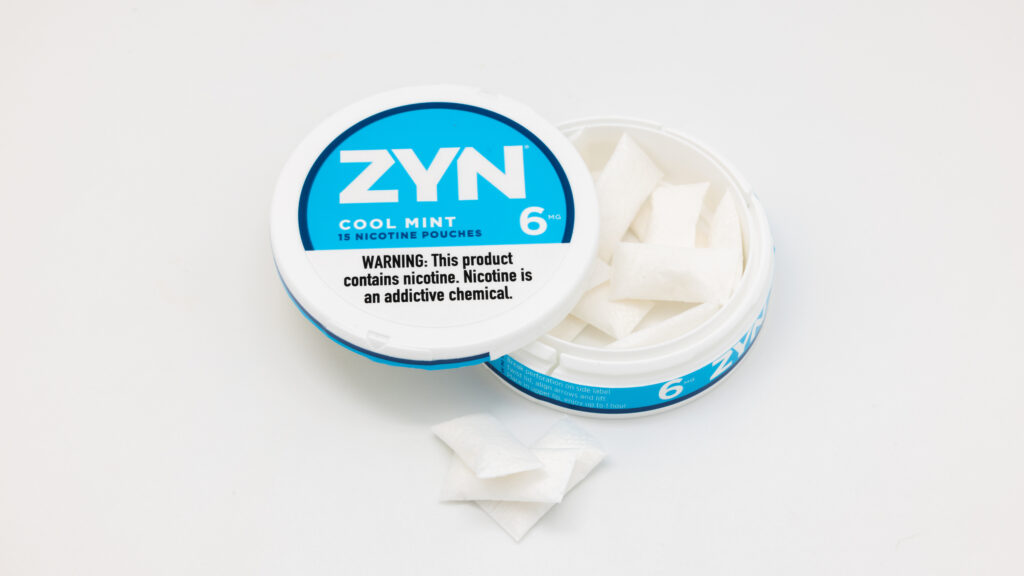Senate Majority Leader Chuck Schumer (D-N.Y.) wants the federal government to investigate Zyn nicotine pouches.
Schumer is no stranger to calling for crackdowns on popular products — he’s done similar with Four Loko and Logan Paul’s line of energy drinks. The problem for Schumer this time around is that many users of Zyn are very passionate, and very, very online.
advertisement
Zyn, a so-called nicotine pouch, has become particularly popular among certain conservative men, the most notable being Tucker Carlson, who recently said, “I use Zyn every second that I’m awake.” Schumer’s remarks have since prompted meme-laden backlash on social media, in conservative news outlets, and especially among Republican members of Congress. Rep. Marjorie Taylor Greene (R-Ga.) called for a “Zynsurrection.” Rep. Richard Hudson (R-N.C.), the chair of the House Republicans campaign arm, tweeted a photo of him in camo proudly holding a Zyn with the message: “Big Brother Schumer doesn’t want us to chew or smoke.” Rep. Mike Collins (R-Ga.) tweeted a new version of the so-called Gonzales flag. The National Republican Senatorial Committee joined in too.
So why is Schumer so upset, and why the sudden backlash from Republicans? STAT walks through three burning questions about the ongoing controversy over Zyn.
Why is Schumer pushing for an investigation of Zyn? And do his reasons make sense?
Schumer is concerned about Zyn because, he said at a press conference Sunday, these products “seem to lock their sights on young kids — teenagers and even lower — and then use the social media to hook ‘em.”
advertisement
But available data suggests that Zyn and similar products aren’t actually popular with young kids, at least so far. Just 1.5% of middle and high school kids reported regularly using nicotine pouches in 2023, according to the annual National Youth Tobacco Survey from the Centers for Disease Control and Prevention and the Food and Drug Administration. By contrast, 7.7% of young people reported using e-cigarettes.
And while Zyn is very popular on social media, it remains unclear how much of that viral popularity is the company’s doing. While the company has advertised on social media platforms, the most popular content promoting Zyn actually appears to be coming from viral posts made by users of the product.
The company told STAT it doesn’t pay people to promote its product online. In a statement, a spokesperson for Philip Morris International, which owns Zyn, said its marketing policies “prohibit the use of social media influencers” and are instead “focused on preventing underage access.”
But one expert on tobacco industry marketing said the company no doubt plays a role in its products’ viral popularity.
“All of that community glorification of their product, much of it has the hand of the company behind it one way or another,” said Robert Jackler, a professor emeritus at Stanford University. He added that “Zyn advertising faithfully adheres to the well-worn tropes of tobacco advertising,” including the use of young, attractive models in ads. A Philip Morris International spokesperson added that the company does not use models under the age of 35 in its ads.
What will the FTC and FDA actually look at?
While Schumer said he wants the Food and Drug Administration and the Federal Trade Commission to probe Zyn, it’s still unclear what exactly he wants the agencies to look at — and whether the product’s manufacturer, Philip Morris International, could actually get in any trouble.
The most obvious line of inquiry for the FTC would be any undisclosed payments to social media influencers. The commission has warned several vape companies in the past for not adequately disclosing when influencers have connections to the companies they tout. But the company said it doesn’t use paid influencers.
The FDA could separately go after Philip Morris International for selling Zyn without first being granted permission to do so. The company’s application with the FDA has been pending since 2020, according to a spokesperson. But Zyn is far from the only nicotine product on the market that has yet to receive a so-called premarket authorization.
Schumer’s office did not respond to requests for comment on what the senator is hoping the FDA and FTC would probe.
Can outrage over a potential Zyn crackdown actually rally Republican voters?
Republicans are piling on Schumer, arguing that his efforts are a further example of the Democratic Party’s overreach into voters’ private lives.
It’s a smart strategy, argued Joe Grogan, the former head of former President Donald Trump’s Domestic Policy Council, who called Schumer’s remarks “a ripe opportunity for people who want to support individual rights, and tolerance, and respecting people’s body autonomy.”
“That’s a fight most Republicans should relish,” said Grogan. “It’s a personal freedom issue.”
But Zyn availability is far from a country-unifying issue. While the product might be wildly popular on TikTok, just a fraction of Americans use the product.
Nevertheless, the issue could mobilize those in the Republican party who are already aggrieved about alleged government overreach, according to one expert on the intersection of health policy and politics.
“The issue itself is not going to sway millions of voters, but it’s another example for a party that is running [on a message of reducing] the size of those regulatory agencies,” said Bob Blendon, a professor emeritus of health policy and political analysis at Harvard T.H. Chan School of Public Health. “They’re just making a point that if you vote for us, we defend your rights to make your own individual decisions.”
STAT’s coverage of the commercial determinants of health is supported by a grant from Bloomberg Philanthropies. Our financial supporters are not involved in any decisions about our journalism.

